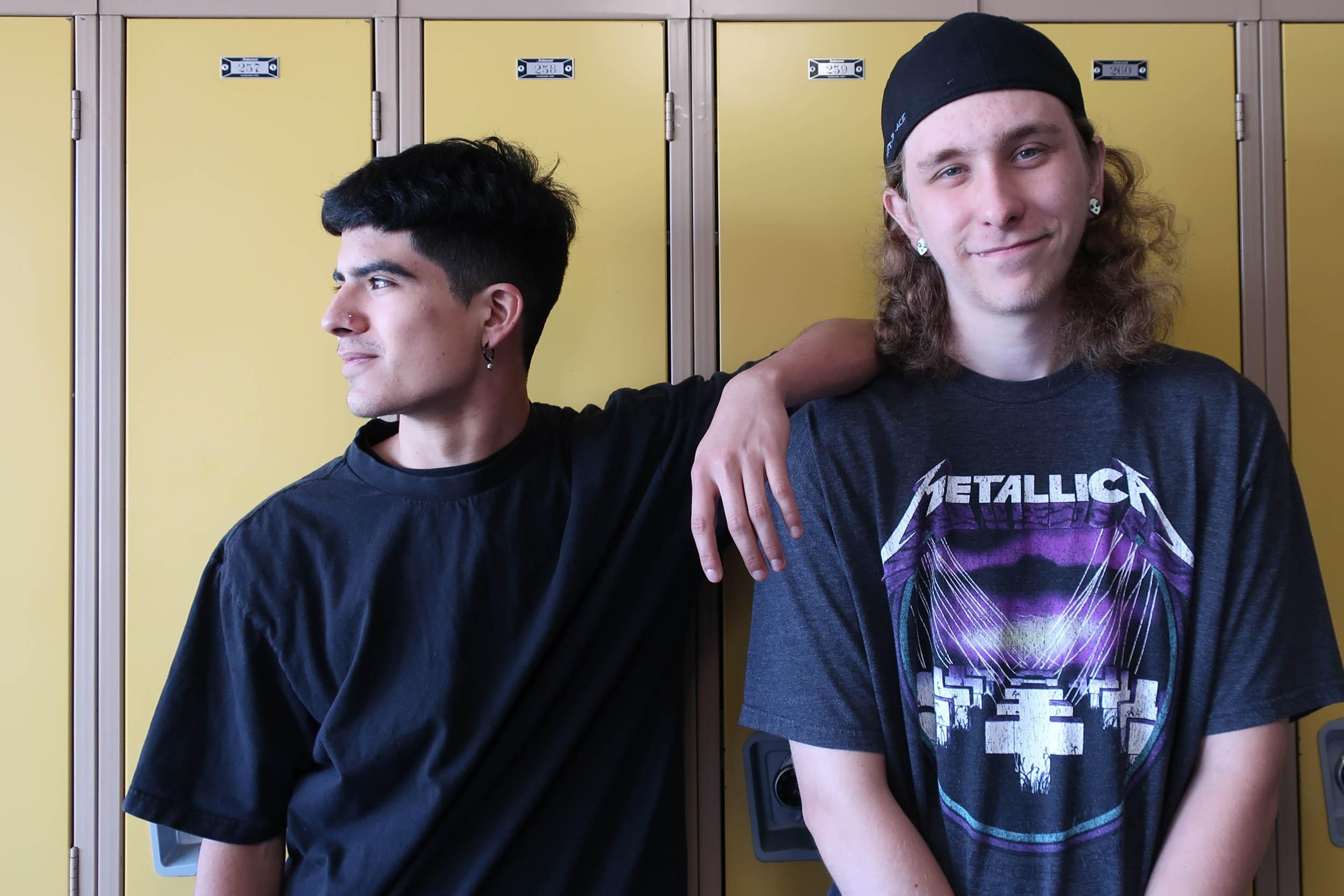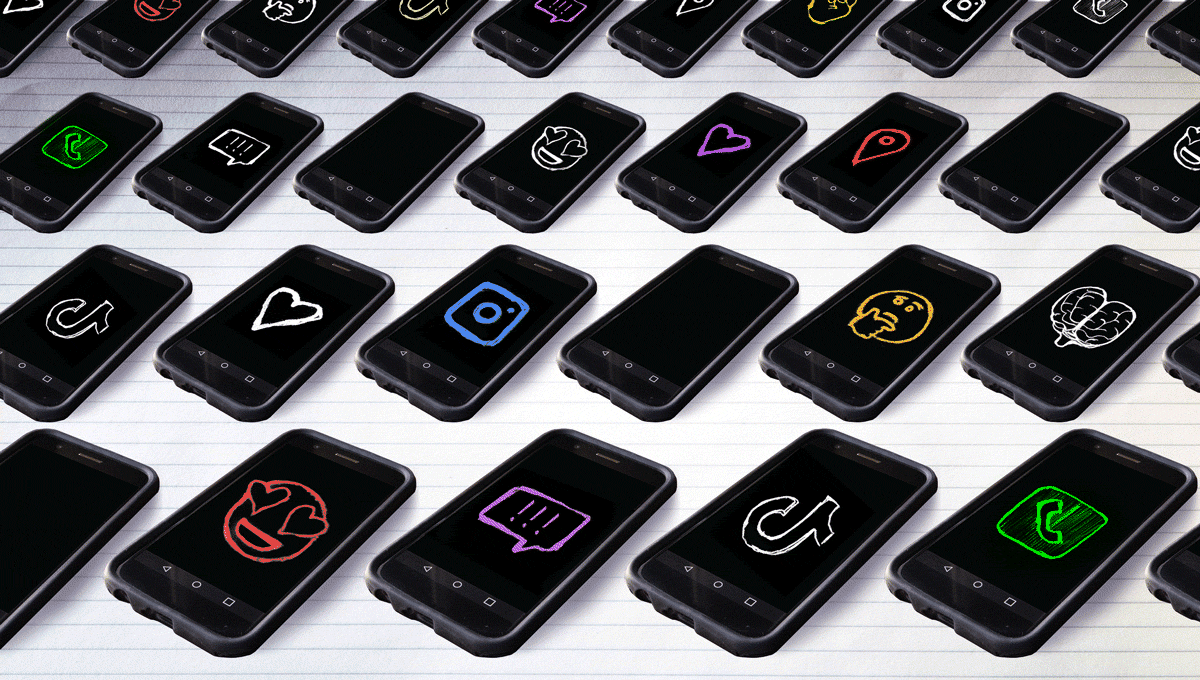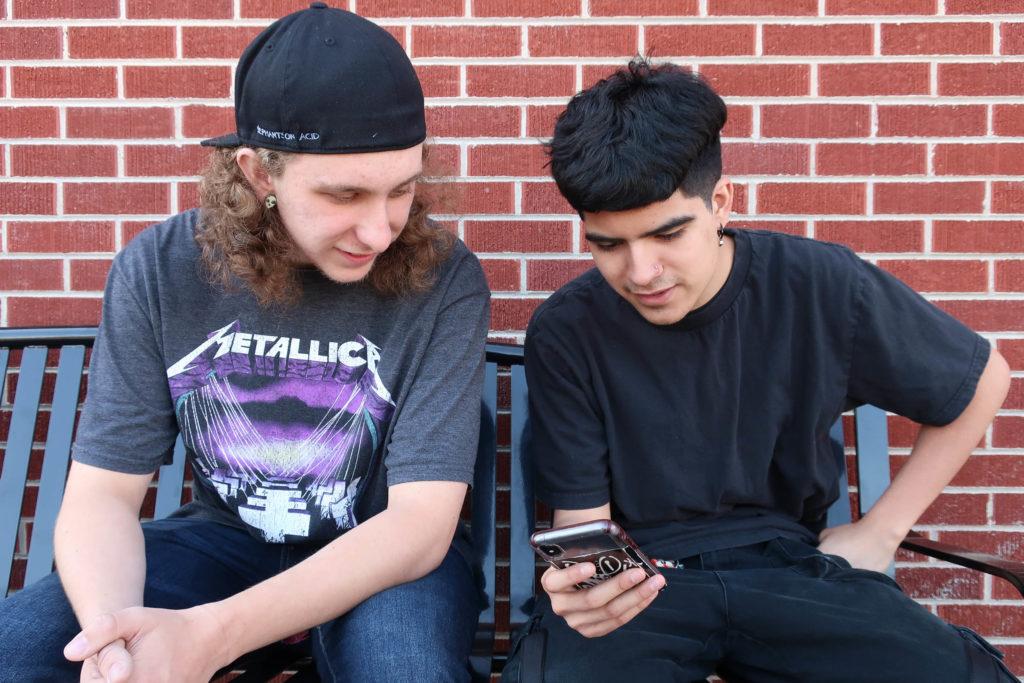
Teens spend, on average, more than seven hours a day using screens and 60 percent of teens themselves say spending too much time online is a “major” problem. As we’ve dug into what’s behind rising rates of teen mental health issues, one factor came up again and again.
The cell phone.
We checked in with two teenagers, Jose and Shawn, about how they use their phones and what they think about it. We’re just using their first names to maintain their privacy. In addition to talking to them directly, we asked if they’d record themselves talking about their phone use at the end of their days for a little while.
They did.
Jose is lean and striking in stylish black pants and black T-shirt. He checks Instagram fashion updates. He scrolls through to see people skateboarding, brand drops, rappers. A new Nike Day of the Dead shoe.
“Oh, for a size 10 it’s $3,000 dollars!” he says in an audio diary. “That’s insane, and it’s a pretty weird looking shoe too.”
The phone is a big part of Jose’s life. He’s 18, he goes to Brady High School in Jefferson County. There, he checks his phone frequently. A lot of kids do.
He often checks the news. Sometimes it’s depressing. But he likes how social media raises awareness about world issues and keeps young people knowledgeable.
Shawn is more wary of the little device, using it on average between two and three hours a day.
Relaxed and good-natured, with curly reddish hair, Shawn wears a backward baseball cap and Metallica shirt when we meet at Brady High.
He says he uses his phone to either call or message his girlfriend on Facebook, listen to music, or YouTube after school. He mostly watches “playthroughs,” live commentary of someone playing a video game. Lately, he’s been watching a lot of Jackscepticeye (“pretty nerdy right?” he says) – an Irish YouTuber and actor who does live commentary as he plays games.
“It’s usually when I’m stressed or when I’m bored and don’t have much to do, I tend to watch YouTube quite a bit,” he says.
Jose says that he didn’t have his phone for a three-month period — it was supposed to be water-resistant (“I tried my luck too much,” he says.). It was a weird feeling and he was really anxious.
“As soon as I lost my phone it felt like I lost my connection to the world,” he says. “I didn’t know anything anymore.”
He was also forced to deal with people – hear them complain or just chatter on. When you have your earbuds in, people don’t bother you and sometimes he prefers not to engage.
Jose doesn’t like that the phone is so time-consuming.
“You can get lost with it, you can become needy with it,” he says.
Research on the impacts of screen time and the adolescent brain is in its infancy so some of the research is conflicting.
A University of Colorado Boulder review found that 90 percent of five-dozen worldwide studies looking at youth age 5 to 17 showed that more screen time is associated with delayed bedtimes, fewer hours of sleep and poorer sleep quality — things that can contribute to exhaustion or exacerbate mental health issues.

Jose explains in a recording that one day he used Facebook a lot “because I wasn’t feeling today, and by that I mean, I didn’t feel good today so I pretty much hopped on social media and blocked everything else out.”
Jose sees the phone’s distraction as a helpful, good thing when he wants to get away from his mood for a minute. He says the phone is a good way to keep himself happy. It’s entertaining, he keeps up with friends. Looking at memes helps. Or listening to music, like Clams Casino.
“It puts me in a different space. It makes me feel really at peace. It’s cool.”
He says he needs music most of the time, “because I get really anxious and so I rely on my phone too much.”
One study shows increased hours online correlate with an increase in teen depression and suicidal thoughts, especially among girls. Other studies have shown no link between tech time and mental health. And some researchers argue that spending a lot of time on the phone could be more of a symptom of being depressed than a cause.
“I feel a lot better after listening to music,” Shawn says in a recording. Anything by Metallica, or newer stuff like Shadow of Intent or Whitechapel. “If I’m really stressed out, if just I'm tired or whatever, I just need to get motivated or like just kinda relax. I can just put in both my headphones and just kind of space out.”
What Shawn likes about his phone is that anything you want to know in the world is in your pocket. What he doesn’t like about it is it’s “super addicting.”
“It’s almost like having, like, a cigarette nicotine addiction. It's really strange. I'll be walking to school or the store and everybody's just looking down on their phones,” he says. “Some people just take it a little too far. They have to like constantly be posting, constantly be texting or on their phone just because they feel like they need it.”
He says he can live without it. But there are times when he knows he has to get off it.
“If I look at the time and it’s like, ‘Oh God, it's already 4 o'clock!’ I've been on my phone almost all day. I'm starting to get a headache. I should probably do something else so I'm not just sitting there getting brain dead.”
Studies show that technology can stimulate the over-release of dopamine – which the brain then wants more of. Compulsive phone or internet use can lead to decreased brain connectivity in parts of the brain that regulate emotions, decision making and impulse control, and can also lead to increased levels of social loneliness, according to studies of adolescents and children.
Teens are astute, they can feel the phone’s addictive nature.
More than half of teens associate being away from their phones with at least one of these: loneliness, being upset or feeling anxious. But it’s hard to pull away. And whose fault is that? Adults are the ones who let them have a phenomenally powerful and addictive tool that gives them access to anything they want — from food delivery to pornography. A lot of kids like Shawn find adults’ feeble protestations of the phone used to be just that: feeble.
“They make it so negative. Instead of saying, ‘Like, hey, why don’t you go do something, why don’t we go out and do something,’ it’s always, ‘Get off your phone, get off your phone. Get the hell off your phone.’ It’s like, what do you want me to do instead, do you got any better ideas?”
If you need help, dial 988 to reach the Suicide and Crisis Lifeline. You can also reach the Colorado Crisis Services hotline at 1-844-493-8255 or text “TALK” to 38255 to speak with a trained counselor or professional. Counselors are also available at walk-in locations or online to chat.
The effects of social media specifically might stand out.
“I use Snapchat, Instagram and Facebook and Twitter. Literally I check around what I have here. I exit, go on here, check what I have on here,” Jose says. “And I do that over and over.”
One recent study suggests that teenagers who spend more than three hours a day on social media are more likely to develop mental health problems including depression, anxiety, aggression and antisocial behavior. The study found that aggressive and anti-social behavior were non-existent in teens who didn’t use social media. The study looks at the use of social media distraction as a coping behavior for stress.
Jose says a lot of young people turn to social media to deal with their problems.
“A lot of people either go on social media to open up just because they don't really feel like they have people to talk to or they close themselves out. They isolate themselves and just listen to music and stuff like that.”
Jose says he respects people who keep their troubles off social media. Sometimes he vents in a post. He hates it when he does that.
“I just don't like seeing myself as an attention seeker, but I just can't help it sometimes because I don't really talk to people, so I don't really have people to talk to. So, I just tend to express everything on social media and it's really toxic.”
He’s deleted things he’s posted and then jumps off social media for a few days, a brief pause in his fraught relationship with his phone.
(On the other hand, Shawn says he uses Facebook when he’s happy.)

Some adolescent psychologists believe that — in some teens and children — the phone has effectively killed the desire or need to develop other passions or hobbies. It now fills those empty spaces and kids become dependent on rewards associated with the cell phone instead of natural rewards such as hobbies or spending time with friends or family.
“Boredom is the space in which creativity and imagination happen,” pediatrician Michael Rich, director of the Center on Media and Child Health at Boston Children’s Hospital, told Harvard’s Mahoney Neuroscience Institute.
Shawn says tracking his phone time made him more aware: “I'm just kind of putting it in perspective of much I use it versus how much other people use it.”
After keeping track of his screen time for a few days, Jose is starting to see how the phone can be a time suck.
“It takes so much time out of my life and I don't even do anything most of the time. I'm just looking through photos and memes.”
He says he kinda wishes he’d stuck with the flip phone.
We want to know more, and we hope you do, too.
CPR News will spend the next few months investigating the factors that have created the ultimate pressure cooker for some teens. We’ll go into their world through audio diaries, interviews, reflection and analysis. Most importantly, we’ll examine what teens, families and schools can do to let some of the pressure loose.
_
Editor's note: This story has been updated with newly released numbers on teen screen use.










